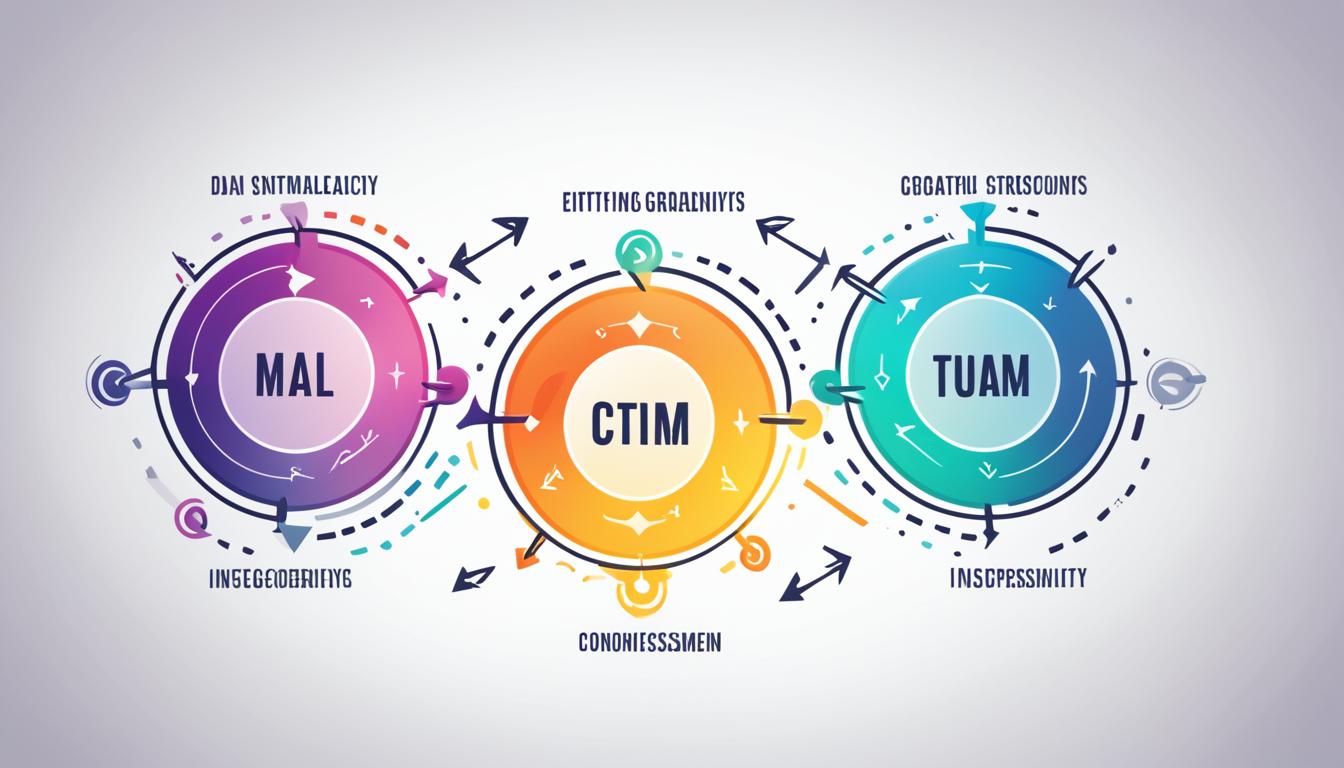Welcome to our article on the Machiavellian Personality Test, a tool for self-discovery and understanding of your character. If you’ve ever found yourself asking, “Who am I?” or wanting to gain deeper insights into your own traits, this interactive assessment might provide the answers you’re looking for.
The Machiavellian Personality Test measures three dark triad personality traits: machiavellianism, narcissism, and psychopathy. By exploring these traits, you can gain a better understanding of yourself and how these traits may impact your behavior and relationships.
Key Takeaways:
- The Machiavellian Personality Test is an interactive assessment for self-discovery and understanding.
- It measures three dark triad personality traits: machiavellianism, narcissism, and psychopathy.
- This test provides insights into your character and how these traits may impact your behavior and relationships.
- By understanding your traits, you can embark on a journey of self-discovery and personal growth.
- Remember, this test is a starting point and not a substitute for professional help if needed.
Understanding the Dark Triad Personality Traits
The dark triad personality traits, which consist of machiavellianism, narcissism, and psychopathy, are characterized by unique and sometimes malevolent characteristics. Understanding these traits is essential for gaining insights into an individual’s behavior and relationships.
Machiavellianism
Machiavellianism is a personality trait that revolves around manipulation and manipulation techniques. Individuals with high levels of machiavellianism are often strategic and calculated in their actions, using manipulation to achieve personal goals.
Narcissism
Narcissism is characterized by an excessive sense of self-importance and a constant need for admiration. Those with narcissistic traits often have an inflated ego, seeking constant validation and recognition from others.
Psychopathy
Psychopathy involves a lack of empathy and remorse, as well as impulsive and antisocial behavior. Psychopathic individuals often prioritize their own needs and desires above those of others, displaying a disregard for societal norms and moral principles.
“Machiavellianism, narcissism, and psychopathy encompass distinct personality traits that can significantly impact an individual’s interactions and overall personality.”
It is important to note that not everyone who possesses these traits will exhibit harmful or destructive behavior. However, individuals with high levels of these dark triad traits may be more prone to manipulation, exploitation, and engaging in actions that prioritize their own self-interests.
By understanding the dark triad personality traits, individuals can develop self-awareness and work towards personal growth. Recognizing these traits in oneself or others can lead to more informed and conscious decision-making, ultimately fostering healthier relationships and improved emotional well-being.
The Short Dark Triad Assessment
The Short Dark Triad (SD-3) is an assessment developed by Delroy Paulhus and Daniel Jones in 2011. It offers a more uniform and concise measurement of the three dark triad personality traits: machiavellianism, narcissism, and psychopathy. With just twenty-seven statements to rate based on agreement, this assessment provides a quick and easy way to evaluate one’s personality traits.
Understanding the SD-3 Assessment:
The SD-3 assessment presents participants with a series of statements related to the dark triad traits. Participants are then asked to rate their level of agreement with each statement on a scale. The assessment covers various aspects of machiavellianism, narcissism, and psychopathy, allowing individuals to gain insights into their personality traits and behaviors.
The Importance of Assessment:
Assessments like the SD-3 help individuals understand their dark triad traits, fostering self-awareness and enabling personal growth. By identifying and acknowledging these personality traits, individuals can better understand how their behaviors and actions may impact themselves and those around them.
Benefits of the SD-3 Assessment:
The SD-3 assessment offers several advantages. Its concise nature makes it convenient for quick evaluations, while also providing a comprehensive overview of the three dark triad traits. The assessment’s clear rating system ensures consistent measurement, enabling individuals to gain a deeper understanding of their machiavellianism, narcissism, and psychopathy traits.

The Three Dark Triad Personality Traits
| Personality Trait | Description |
|---|---|
| Machiavellianism | A manipulative attitude characterized by strategic thinking and a willingness to deceive others for personal gain. |
| Narcissism | Excessive self-love, a need for admiration, and a sense of superiority. Narcissists often lack empathy for others. |
| Psychopathy | Characterized by a lack of empathy, impulsivity, and a disregard for social rules and norms. Psychopaths may exhibit antisocial behavior. |
References:
- Paulhus, D. L., & Jones, D. N. (2011). Measures of dark personalities. In Pantheon Books.
The MACH-IV Machiavellianism Test
Are you curious to know where you stand on the spectrum of machiavellianism? The MACH-IV test is a popular and widely used assessment tool that can provide valuable insights into your level of machiavellianism. Developed by Richard Christie and Florence L. Geis in the 1970s, this test is based on statements derived from Machiavelli’s writings, known for their strategic and manipulative principles.
The MACH-IV test consists of twenty items that evaluate your agreement with each statement. It measures characteristics such as a willingness to manipulate others, a focus on self-interest, and a pragmatic approach to achieving goals. By completing this test, you can gain a better understanding of your own machiavellian tendencies.
Keep in mind that the MACH-IV test is not meant to label or categorize you definitively. Rather, it serves as a tool for self-reflection and self-awareness. Understanding your machiavellian traits can help you navigate social interactions, evaluate your decision-making processes, and identify areas for personal growth.
Take a moment to complete the MACH-IV test and discover new insights about yourself. Remember, this assessment is for personal exploration only and should not replace professional advice or diagnosis. Consult a mental health professional if you have concerns about your personality or behavior.
Sample Questions from the MACH-IV Test
- I would rather win a competition than build interpersonal relationships.
- If I need to manipulate someone to get what I want, I will do it without hesitation.
- It is wise to bypass the rules if it benefits me personally.
After completing the test, evaluate your answers honestly and interpret the results with an open mind. Remember, the goal is not to label yourself as “machiavellian” or “non-machiavellian,” but rather to gain deeper insights into your own tendencies and behaviors.
Ready to discover your level of machiavellianism? Take the MACH-IV test and embark on a journey of self-discovery.

Exploring the Traits of the Dark Triad
Each of the traits in the dark triad – narcissism, psychopathy, and machiavellianism – has distinct characteristics.
Narcissism is characterized by a sense of superiority and grandiosity. Individuals with narcissistic traits often display self-centered behaviors and have an excessive need for admiration and attention.
Psychopathy involves impulsivity and a lack of empathy. People with psychopathic traits tend to be deceitful, manipulative, and disregard the feelings and well-being of others.
Machiavellianism entails manipulative behaviors focused on self-interest. Those with machiavellian traits are skilled in manipulation tactics, often using others for personal gain without remorse or concern for their well-being.
These dark triad traits may manifest as a lack of respect for others, arrogance, manipulation, and a strong desire for power. It is important to recognize these traits, as they can significantly impact an individual’s behavior and relationships.

Recognizing Dark Triad Traits
Here are some common behaviors associated with the dark triad traits:
- Exploiting others for personal gain
- Engaging in manipulative behaviors
- Lacking empathy and remorse
- Having an inflated sense of self-importance
- Displaying grandiose and narcissistic attitudes
- Engaging in impulsive and risky behaviors
- Exhibiting a strong desire for power and control
“The dark triad traits can have a profound impact on an individual’s personal and professional relationships. It is essential to be aware of these traits, not only in ourselves but also in others, to navigate these dynamics effectively.”
Understanding the dark triad traits can help us recognize and address these behaviors both in ourselves and in others. By being aware of the characteristics associated with the dark triad, we can make informed decisions and foster healthier relationships.
Understanding the Dark Triad Personality Test
The dark triad personality test is a self-screening tool that allows individuals to assess whether they exhibit traits associated with the dark triad. It provides valuable insights into one’s behavioral tendencies and can be a helpful tool for self-reflection and personal growth.
However, it is important to note that the dark triad personality test is not intended as a diagnostic tool. It should be used solely for educational purposes to gain a better understanding of one’s personality traits.
To receive an official diagnosis and comprehensive assessment of dark triad traits, it is recommended to consult a licensed mental health professional. A mental health professional possesses the expertise and knowledge to accurately evaluate and diagnose personality disorders.
Consulting a mental health professional can provide a holistic approach to understanding and managing dark triad traits. They can guide individuals in exploring underlying causes, providing effective treatment strategies, and offering support throughout the process.
Remember, the dark triad personality test is a valuable self-screening tool, but it is not a substitute for professional guidance. Seeking the assistance of a mental health professional ensures a thorough evaluation and personalized treatment plan tailored to your specific needs.

Benefits of Consulting a Mental Health Professional
When it comes to understanding the complexities of dark triad traits, a mental health professional can offer several benefits:
- Accurate Diagnosis: A licensed mental health professional has the expertise to provide an accurate diagnosis based on thorough assessments and evaluations.
- Personalized Treatment: They can develop a personalized treatment plan targeting specific dark triad traits and ensuring the best possible outcomes.
- Support and Guidance: Mental health professionals provide ongoing support and guidance throughout the treatment process, helping individuals overcome challenges and fostering personal growth.
- Therapeutic Techniques: They employ evidence-based therapeutic techniques to address and manage dark triad traits, promoting positive behavioral changes.
- Collaboration: Working with a mental health professional allows for collaboration and open communication, fostering a trusting and supportive therapeutic relationship.
By consulting a mental health professional, individuals can embark on a journey of self-discovery and personal growth, gaining valuable insights into their dark triad traits and working towards positive change.
| Benefits of Consulting a Mental Health Professional |
|---|
| Accurate Diagnosis |
| Personalized Treatment |
| Support and Guidance |
| Therapeutic Techniques |
| Collaboration |
The Significance of Dark Triad Traits
Dark triad traits can have significant implications for mental health conditions and diagnoses. While psychopathy and machiavellianism are not official diagnoses in the Diagnostic and Statistical Manual of Mental Disorders (DSM-5), individuals exhibiting these traits may receive a diagnosis of antisocial personality disorder (ASPD) or narcissistic personality disorder. Moreover, dark triad traits can also be associated with conditions such as conduct disorder.
Diagnosing mental health conditions related to dark triad traits is a complex process that requires the expertise of a mental health professional. Through comprehensive assessments and evaluations, these professionals can determine if the individual meets the criteria for specific disorders and provide appropriate diagnoses. Understanding the presence of dark triad traits can aid in the identification and treatment of underlying mental health conditions.
In order to gain accurate insights into one’s mental health, it is crucial to consult with licensed mental health professionals who can provide a comprehensive analysis of dark triad traits and their potential impact on overall well-being.
| Conditions Associated with Dark Triad Traits | Description |
|---|---|
| Antisocial Personality Disorder (ASPD) | A condition characterized by a pervasive disregard for the rights and feelings of others, manipulation, and a lack of remorse or empathy. Individuals with ASPD often exhibit dark triad traits such as psychopathy and machiavellianism. |
| Narcissistic Personality Disorder | A personality disorder characterized by an excessive sense of importance, a lack of empathy, and a constant need for admiration. Narcissism is one of the dark triad traits that can contribute to this disorder. |
| Conduct Disorder | A childhood or adolescent disorder characterized by aggressive and antisocial behaviors. Dark triad traits, such as psychopathy and machiavellianism, can be present in individuals with conduct disorder. |
These conditions can have a significant impact on an individual’s life, relationships, and overall mental well-being. Seeking professional help is essential for accurate diagnosis and the development of an appropriate treatment plan.

Treatment and Support for Dark Triad Traits
Treating dark triad personality traits can be challenging, as there is no specific treatment for these traits. However, a mental health professional can provide support and strategies to address each individual trait.
With the right treatment and support, individuals with dark triad traits can learn to manage their behaviors and improve their overall well-being.
It is important to remember that seeking help from a mental health professional is crucial in addressing dark triad traits. These professionals have the expertise and knowledge to guide individuals through the process of understanding and managing these traits effectively.
“The guidance and support of a mental health professional can make a significant difference in the lives of individuals with dark triad traits. They can help individuals develop coping mechanisms, improve interpersonal relationships, and work towards personal growth.”
Together, we can support individuals in their journey towards personal growth and well-being despite the challenges of dark triad traits. If you or someone you know exhibits these traits, reach out to a mental health professional to find the support and strategies needed to navigate this complex aspect of personality.

Support Strategies for Dark Triad Traits
When addressing dark triad traits, a mental health professional may employ various strategies tailored to each individual’s needs. These strategies may include:
- Developing self-awareness and insight into one’s behaviors and their impact on others.
- Working on enhancing empathy and fostering understanding of others’ perspectives.
- Learning effective communication and conflict resolution skills to improve relationships.
- Exploring and practicing techniques for managing manipulative tendencies or self-centered behaviors.
- Engaging in therapy or counseling to address any underlying emotional issues or trauma that may contribute to the development of dark triad traits.
These strategies, implemented under the guidance of a mental health professional, can help individuals with dark triad traits navigate their behaviors more effectively and promote healthier relationships.
The Importance of Seeking Professional Help
If you suspect that you or someone you know may have dark triad personality traits, it is crucial to seek professional help. A licensed mental health professional can provide a proper diagnosis and determine if the behaviors are indicative of an underlying mental health condition. They can also recommend a treatment plan tailored to the individual’s needs.
Seeking professional help is essential for several reasons:
- Accurate diagnosis: A mental health professional has the expertise to accurately assess and diagnose dark triad traits. They can distinguish between normal personality variations and more severe mental health conditions.
- Tailored treatment: Once diagnosed, a licensed professional can design a treatment plan specific to the individual’s mental health needs. Treatment options may vary depending on the severity of the traits and the presence of any co-occurring mental health conditions.
- Expert guidance: A mental health professional can provide invaluable guidance and support throughout the treatment process. They can offer strategies for managing dark triad traits, improving coping skills, and promoting overall well-being.
- Access to resources: Professionals in the mental health field often have access to a wide range of resources, including therapy modalities, support groups, and educational materials. These resources can enhance the individual’s understanding of their traits and facilitate their personal growth journey.
Remember, seeking professional help is not a sign of weakness but a proactive step towards better mental health. If you or someone you know is exhibiting dark triad traits, it’s important to reach out to a qualified mental health professional to receive the support and guidance needed for diagnosis, treatment, and overall well-being.
Quote:
“A licensed mental health professional can provide a proper diagnosis and determine if the behaviors are indicative of an underlying mental health condition.”
Benefits of Seeking Professional Help
| Benefits | Description |
|---|---|
| Accurate diagnosis | A licensed professional can accurately assess and diagnose dark triad traits, differentiating them from normal personality variations. |
| Tailored treatment | Professionals can design personalized treatment plans based on the severity of the traits and any co-occurring mental health conditions. |
| Expert guidance | Mental health professionals provide valuable guidance, support, and strategies for managing dark triad traits and improving overall well-being. |
| Access to resources | Professionals have access to a wide range of resources that can enhance understanding and support personal growth in managing dark triad traits. |
By seeking professional help, individuals can take a proactive approach to address their dark triad traits and work towards positive changes in their lives.

Limitations of Self-Screening Tests
Self-screening tests, such as the dark triad personality test, can be a useful tool for self-awareness, allowing individuals to gain insights into their personality traits. However, it is important to recognize their limitations and understand that they cannot replace a professional diagnosis. Only a licensed mental health professional is qualified to provide an accurate assessment and diagnosis of dark triad traits.
Self-screening tests should be viewed as a starting point for self-reflection and exploration, but they should be followed up with professional evaluation if necessary. These tests can provide valuable information about one’s tendencies towards machiavellianism, narcissism, and psychopathy, but they cannot replace the expertise of a trained professional in providing a comprehensive assessment.
“Self-screening tests are informative tools that can help individuals gain initial insights into their traits, but they should not be used as a substitute for professional evaluation and diagnosis.”
A licensed mental health professional has the expertise to differentiate between normal personality traits and the presence of a specific mental health condition related to the dark triad traits. They can identify any underlying issues and provide appropriate treatment recommendations tailored to the individual’s needs.
While self-screening tests can be a valuable starting point for self-exploration, seeking a professional diagnosis is essential for a comprehensive understanding of one’s personality traits. Professional evaluation ensures accuracy and provides individuals with the necessary guidance and support for personal growth and improvement.
Embracing Self-Discovery and Personal Growth
Embarking on a journey of self-discovery through personality tests like the Machiavellian Personality Test allows us to gain valuable insights into our unique traits and behaviors. By understanding the dark triad traits of machiavellianism, narcissism, and psychopathy, we can begin to navigate our personal growth journey with clarity and purpose.
Self-discovery is a powerful tool that empowers us to embrace our authentic selves and make conscious choices for our personal development. By identifying our strengths and weaknesses, we can nurture our positive qualities and address areas that require improvement. Through this process, we can take control of our lives and create positive changes that align with our values and aspirations.
Embracing our traits, even those associated with the dark triad, does not mean endorsing negative or harmful behaviors. Rather, it involves acknowledging and accepting all aspects of ourselves, recognizing that personal growth comes from self-awareness and a commitment to change. With the right mindset and support, we can transform our traits into opportunities for growth and become our best selves.
In this journey of self-discovery and personal growth, it’s essential to seek the appropriate support if needed. Mental health professionals can provide guidance, strategies, and therapeutic interventions tailored to our individual needs. They can help us navigate challenges, overcome obstacles, and develop healthy coping mechanisms. Remember, embracing our traits and embarking on personal growth is a courageous and transformative process that can lead us to a more fulfilling and authentic life.









